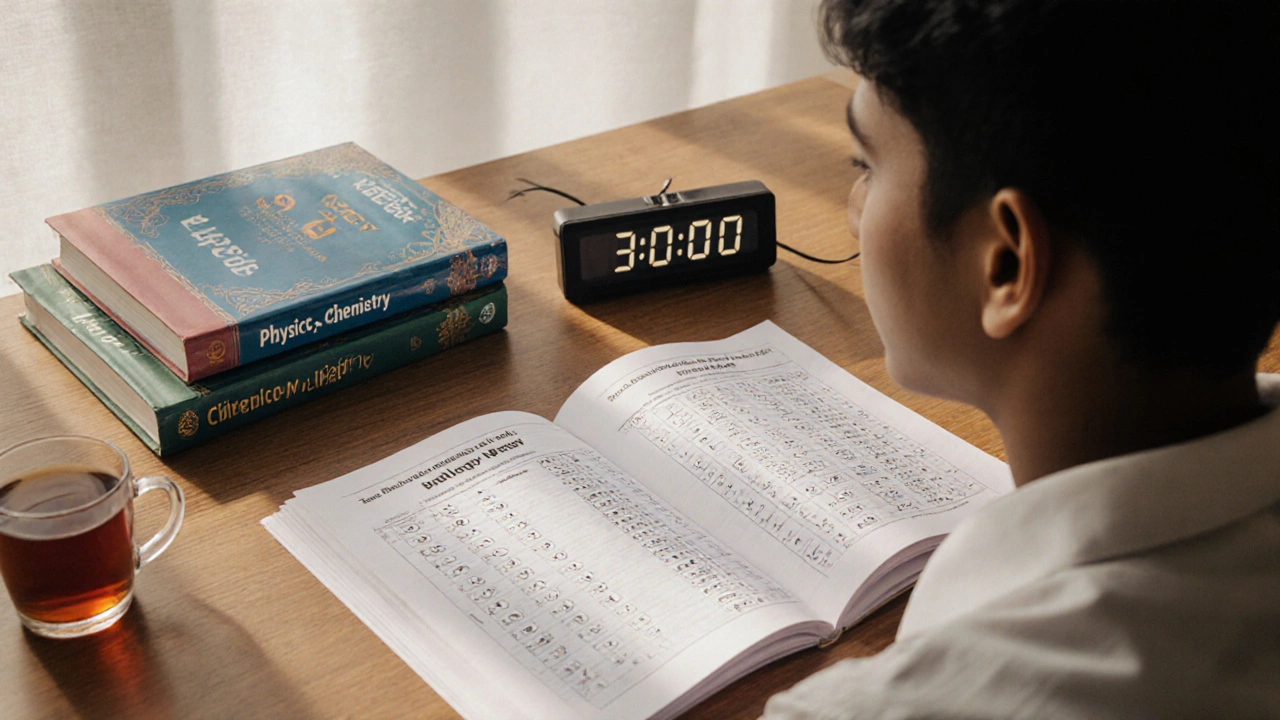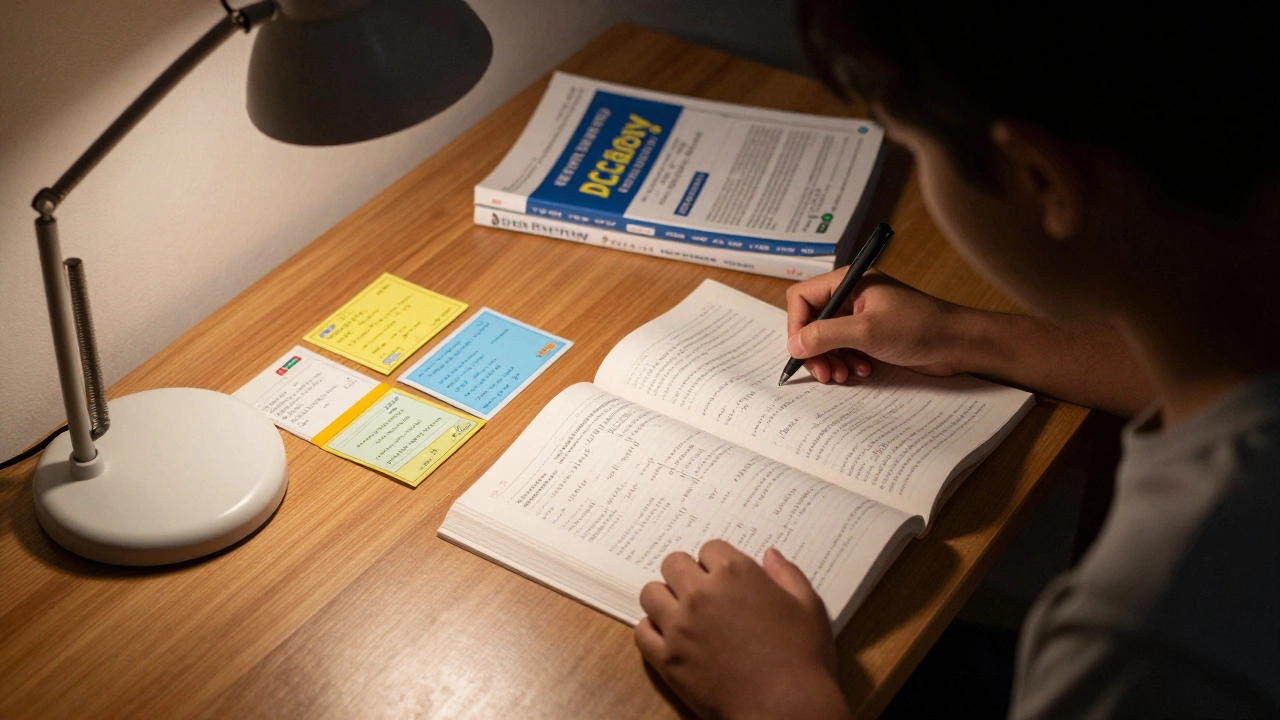NEET Score Calculator
Calculate Your NEET Score
Estimate your score based on correct/wrong answers. Remember: 4 marks for correct, -1 for wrong.
Your Estimated Score
Physics
0
Chemistry
0
Biology
0
Total Score
0
Accuracy: 0%
When it comes to cracking NEET is the National Eligibility cum Entrance Test, India's single‑step exam for MBBS and BDS seats, a smart practice plan beats sheer hours.
Know the exam inside‑out
The first step is to understand the NEET exam pattern comprises 180 multiple‑choice questions - 45 physics, 45 chemistry, and 90 biology - to be answered in three hours. In 2025 the marking scheme stays the same: 4 marks for a correct answer, -1 for a wrong one. Knowing this helps you allocate time per section and decide where to focus your practice.
Build a rock‑solid foundation with NCERT
Nothing outranks the NCERT textbooks the official curriculum books for physics, chemistry and biology used across Indian schools. Start by reading every chapter, then solve the end‑of‑chapter questions. If you can explain a concept to a friend in plain language, you’ve truly mastered it.
Design a realistic study schedule
Every successful aspirant follows a study schedule a weekly plan that splits time between theory, practice, and revision. Here’s a simple template:
- Monday‑Wednesday: 2 hours physics, 2 hours chemistry, 2 hours biology.
- Thursday‑Friday: 3 hours mixed mock questions + review.
- Saturday: Full‑length mock test under timed conditions.
- Sunday: Light revision + error‑log analysis.
Adjust the hours based on your strengths and weaknesses. The key is consistency, not marathon sessions.
Choose the right practice resources
After NCERT, you need question banks that mimic the real test. Below is a quick comparison of the most popular options in 2025.
| Platform | Strength | Number of MCQs | Live Sessions | Price (Annual) |
|---|---|---|---|---|
| Aakash | Extensive theory + video explanations | 28,000+ | Weekly | ₹15,000 |
| BYJU's | Adaptive AI‑driven quizzes | 25,000+ | Bi‑weekly | ₹12,500 |
| Toppr | Concept‑wise practice sets | 22,000+ | Weekly webinars | ₹10,000 |
| Oliveboard | Fast‑track mock tests | 30,000+ | None | ₹8,000 |
Pick the one that fits your learning style. If you love video lessons, go with BYJU's; if you crave hundreds of full‑length mocks, Oliveboard is a solid pick.
Make practice active, not passive
Simply reading solutions isn’t enough. Try these tactics:
- NEET practice should involve timed MCQ bursts - 30 questions in 30 minutes, then immediate review.
- Create flashcards concise notes on formulas, reactions, and tricky concepts for quick recall.
- Teach a topic to a sibling or study buddy - explaining forces in physics or the Krebs cycle in biology forces you to fill knowledge gaps.
Analyze every test - the error log
After each mock, open a fresh error log a spreadsheet where you record every wrong answer, reason for the mistake, and the correct concept. Categorize errors as:
- Conceptual - you didn’t know the rule.
- Careless - you mis‑read a question.
- Time pressure - you guessed due to lack of time.
Review this log weekly and revise the flagged topics. Over time you’ll see the same error type shrinking.
Mock test strategy - when and how
Start with a full mock every weekend for the first two months. Then increase frequency to twice a week as the exam approaches. Follow this routine:
- Set up a quiet room, turn off phone, and use a real‑time timer.
- Attempt the paper exactly as NEET does - no pauses, no calculator (unless allowed).
- After finishing, take a 30‑minute break, then review every question.
- Calculate your accuracy per section. Aim for >70% in biology, >65% in physics and chemistry before the final month.
Common pitfalls and how to dodge them
Even top scorers stumble on a few habits. Spot them early:
| Pitfall | Why it hurts | Quick fix |
|---|---|---|
| Skipping NCERT | Most NEET questions are directly based on NCERT wording. | Finish NCERT first; use it for every concept. |
| Over‑reliance on one source | Limits exposure to question styles. | Mix at least two question banks. |
| Studying without breaks | Leads to burnout and reduced retention. | Apply the 50‑10 rule - 50 min study, 10 min break. |
| Ignoring analysis | Repeats same mistakes. | Maintain an error log and revisit weekly. |
Final checklist before the exam
- All three NCERT books read and highlighted.
- At least 10 full mock tests completed.
- Error log shows < 5% recurring mistakes.
- Sleep 7‑8 hours daily in the last two weeks.
- Exam‑day kit ready: admit card, photo ID, water bottle.

How many hours should I study daily for NEET?
Aim for 6‑8 hours on weekdays and 10‑12 hours on weekends. Break the time into 2‑hour blocks with 10‑minute breaks to keep focus.
Is it better to use one question bank or multiple?
Mixing at least two reputable sources (e.g., Aakash + Oliveboard) gives you varied question styles and reduces over‑fitting to a single pattern.
When should I start taking full mock tests?
Begin with a full mock after completing the first two NCERT volumes (usually 6‑8 weeks into your prep). Increase frequency as the exam draws near.
How do I stay motivated during long study periods?
Set micro‑goals (e.g., finish a chapter, solve 50 MCQs), reward yourself with short breaks, and track progress on a visible wall chart.
What should I do on the day before the NEET exam?
Light revision only - skim your flashcards, avoid new topics, eat a balanced meal, and get to bed early for a full night’s sleep.









0 Comments